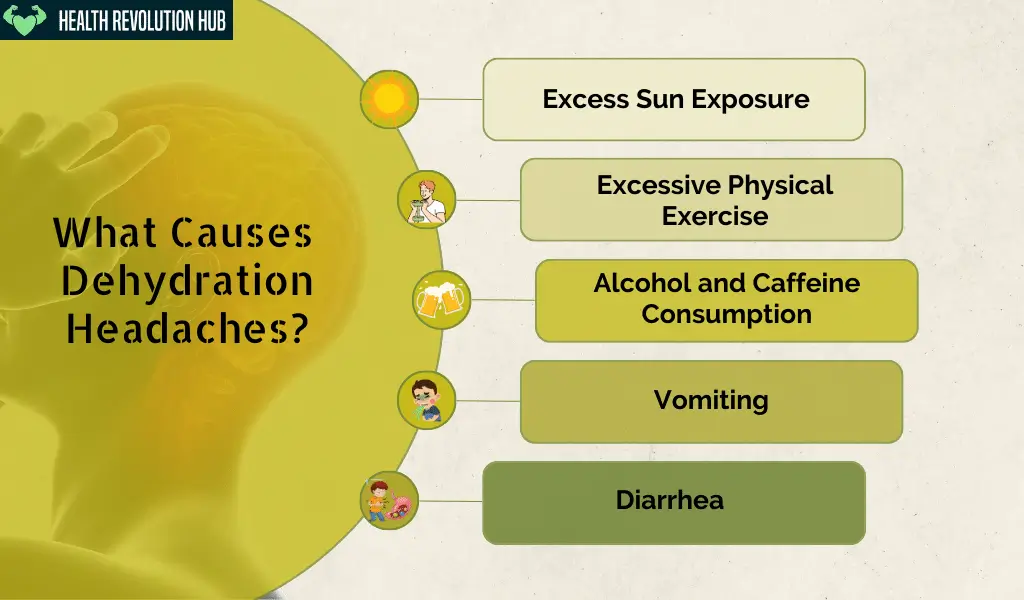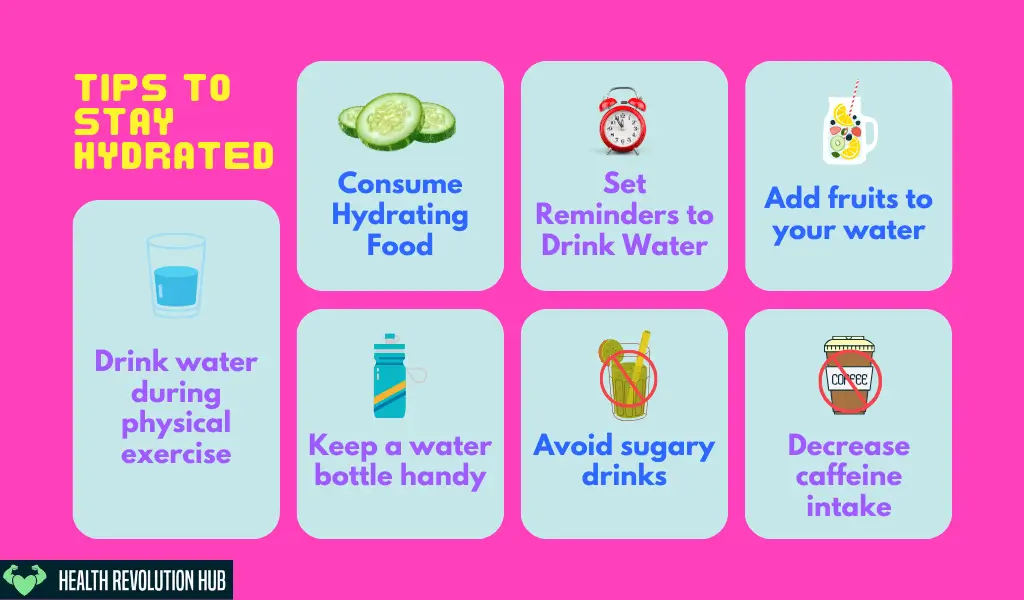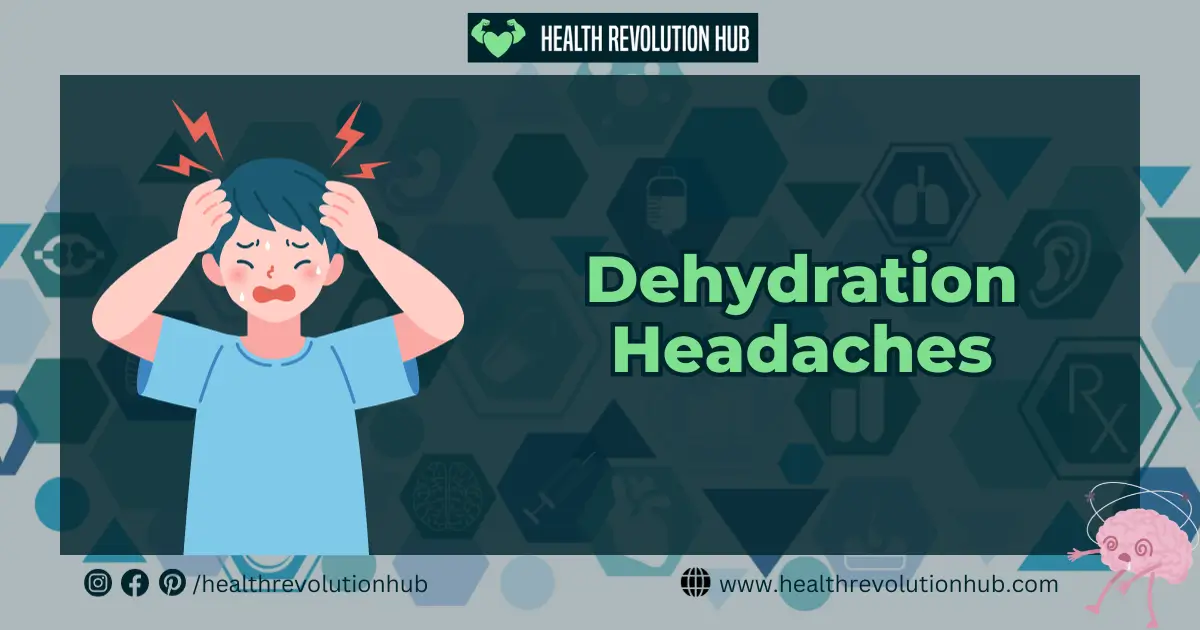You wake up in the middle of the night, your head throbbing as if there’s a band tightly constricting your forehead. Is it your irregular sleep cycle or something else? Ever thought that maybe you just need a tall glass of water?
Before you reach for the painkillers, consider that the culprit might be dehydration. Yes, that’s right! Mild to moderate dehydration can actually trigger nagging headaches that disrupt your day and productivity
In this blog post, I’ll share simple strategies to keep you hydrated and headache-free. From incorporating hydrating foods into your diet to tracking your water intake, each hack is designed to ensure proper hydration levels. Whether you’re a busy professional, a fitness enthusiast, or just someone who wants to stay healthy, these tips will come in handy
Understanding Dehydration Headaches
Dehydration headaches occur when the body loses more fluids than it takes in, leading to a decrease in blood volume and subsequent decreased oxygen supply to the brain. These headaches can be debilitating and have a significant impact on our daily lives. By understanding the causes, signs, and effective relief measures, you can minimize the frequency and intensity of dehydration headaches, ensuring a better quality of life.
The Dehydration and Headache Connection
When you fail to drink enough water, you’re setting the stage for a dehydration headache. Here’s how it works:
- Your brain shrinks from fluid loss, pulling away from the skull and triggering a painful response: a headache.
- Dehydration leads to reduced blood volume. Lower blood volume means less oxygen reaches the brain, which makes the blood vessels enlarge to compensate, causing your head to ache.
- Also, lack of water often results in increased body temperature, causing headaches in response.
We tend to overlook this discomfort, attributing it to stress or fatigue, but in many cases, it’s a desperately needed drink of water that’s the cure.
“Taking in adequate amounts of fluid can often mean the difference between waking up refreshed or with a lingering headache.”
– Anonymous Healthcare Provider
What Causes Dehydration Headaches?
Dehydration headaches can stem from various factors that contribute to fluid loss. The primary cause is inadequate water intake, but there are other underlying factors that can trigger these headaches.

Understanding the causes can help you take necessary precautions and make lifestyle adjustments to alleviate them.
Here are some common causes of dehydration headaches:
- Inadequate Water Intake: Not consuming enough water throughout the day is a major cause of dehydration headaches. Our bodies require an adequate amount of water to function optimally, and when we don’t meet these requirements, headaches can occur.
- Excessive Sweating: Engaging in physical activities or being in a hot environment for extended periods can lead to excessive sweating, resulting in fluid loss.
- Illnesses: Certain illnesses, such as a fever, vomiting, or diarrhea, can cause dehydration due to increased fluid loss from the body.
- Alcohol and Caffeine Consumption: Both alcohol and caffeine act as diuretics, increasing urine production and leading to dehydration if not balanced with adequate water intake.
- Medications: Some medications, especially diuretics, can cause increased urine production and fluid loss from the body, leading to dehydration and headaches.
- Environmental Factors: Living in dry climates or at high altitudes can increase fluid loss through evaporation from the skin and respiratory system.
By identifying the causes specific to your situation, you can take appropriate measures to prevent dehydration headaches and their associated discomfort.
Identifying a Dehydration Headache
So, how do you know if you’re having a dehydration headache? While there’s no one-size-fits-all answer since individual experiences can vary, common symptoms include:
- Throbbing or pulsating pain on one or both sides of the head.
- Increased sensitivity to light and noise.
- Feeling lightheaded or dizzy.
- Fatigue or tiredness.
- Difficulty concentrating or brain fog.
- Dry or sticky mouth.
- Dark-colored urine or decreased urine output.
- Dry skin and eyes.
- Muscle cramps or weakness.
Consulting a physician will help accurately diagnose the type of headache and the appropriate treatment strategy.
Water is key component but if you are well hydrated and still feel dizziness you should give claritox pro a try. Completely organic do not contain anydangerous stimulants or toxins, and more importantly, they are not habit forming.
Dehydration Headache Relief: Natural Remedies
Relieving dehydration headaches does not necessarily require medication. In fact, there are several natural remedies that can alleviate the pain and discomfort associated with these headaches. Incorporating these remedies into your routine can provide effective relief while avoiding potential side effects from medications.
Stay Hydrated Throughout the Day
The first and most crucial step in relieving dehydration headaches is to stay adequately hydrated. Consistently replenishing fluids can help restore the body’s hydration levels and alleviate headaches. Here are some tips to ensure you stay hydrated:
- Keep a water bottle with you at all times and sip water regularly.
- Set reminders or alarms to prompt you to drink water throughout the day.
- Consume hydrating foods with high water content, such as watermelon, cucumber, and citrus fruits.
Include Electrolytes in Your Diet
Electrolytes play a vital role in maintaining proper fluid balance and hydration levels in the body. Including foods rich in electrolytes can aid in rehydration and alleviate dehydration headaches. Consider incorporating the following into your diet:
- Coconut water is a natural source of electrolytes.
- Fruits like bananas, oranges, and kiwis, are rich in potassium.
- Leafy greens such as spinach and kale, provide essential electrolytes like magnesium.
Avoid Dehydrating Substances
Certain substances can exacerbate dehydration headaches by increasing fluid loss from the body. It’s important to minimize the intake of these substances to prevent dehydration and its associated symptoms. Here’s what you should avoid:
- Alcoholic beverages, act as diuretics and increase urine production.
- Caffeinated drinks like coffee and soda, have a dehydrating effect.
- Salty and processed foods, as excess sodium can lead to fluid imbalance.
Utilize Cold Packs
Cold therapy can provide relief from dehydration headaches by numbing the area and reducing inflammation. Applying a cold pack to your forehead or the back of your neck can alleviate pain and help you relax. Ensure the cold pack is wrapped in a towel to prevent direct contact with the skin and avoid potential frostbite.
Try Aromatherapy
Aromatherapy is a natural and effective way to relieve headache pain and promote relaxation. Certain essential oils have analgesic and calming properties that can alleviate dehydration headaches. You can use essential oils in the following ways:
- Add a few drops of lavender or peppermint essential oil to a diffuser and let the aroma fill the room.
- Mix a few drops of essential oil with a carrier oil and gently massage it onto your temples or forehead.
Prevention: Tips to Stay Hydrated and Avoid Dehydration Headaches

Prevention is key when it comes to avoiding dehydration headaches. By making a few adjustments to your lifestyle and incorporating healthy habits, you can significantly reduce the frequency and intensity of these headaches. Here are some tips to keep you hydrated and headache-free:
Set Reminders to Drink Water Regularly
With busy schedules and distractions, it’s easy to forget to drink enough water throughout the day. Setting reminders or alarms on your phone can serve as prompts to ensure regular hydration. Aim to drink at least 8 glasses (64 ounces) of water per day, or more if you engage in high-intensity physical activities.
Opt for Hydrating Foods
In addition to drinking water, you can maintain hydration levels by consuming foods that have a high water content. Incorporate these hydrating foods into your daily meals and snacks:
- Watermelon, which is rich in water and electrolytes.
- Cucumber, which has a high water content and provides essential vitamins.
- Celery, known for its hydrating properties and fiber content.
Remember that beverages with high sugar or caffeine may cause dehydration, so consume them in moderation.
Tips for staying hydrated during physical activity
Physical activity and hot weather can speed up fluid loss from the body, increasing the risk of dehydration headaches. It’s important to be mindful of these factors and take extra precautions. Here’s what you can do:
- Drink water before, during, and after physical activities.
- Wear breathable clothing and consider using a cooling towel to regulate body temperature.
- If exercising outdoors, choose cooler times of the day to minimize exposure to extreme heat.
Limit Intake of Dehydrating Substances
Certain substances, such as alcohol and caffeine, can contribute to dehydration. While it’s not necessary to completely eliminate them, it’s important to moderate your consumption and balance them with adequate water intake. Consider these guidelines:
- Limit alcohol intake and alternate alcoholic beverages with water.
- Gradually reduce caffeine intake to minimize its diuretic effect, and ensure hydration through water consumption.
Triumphing Over Dehydration: Prevention is Cure
Beating a dehydration headache goes beyond stopping at the water cooler more often. It requires holistic lifestyle changes.
Drinking enough water – how much is enough?
You’ve probably heard about the golden rule: eight 8-ounce glasses of water a day. But hydration depends on various factors like body size, weather, and physical activity. Your urine color can be a practical indicator: straw to light yellow signifies good hydration.
Make hydration a conscious part of your daily routine. Maybe start your morning with a glass of lukewarm water with lemon, or invest in a high-quality water bottle to take on the go.
Conclusion: Your Health, Your Hand
Preventing dehydration headaches is far from rocket science – it’s understanding your body’s signals, the importance of water, and making healthy, hydrating choices daily.
With a proactive approach, you can stay hydrated, prevent dehydration headaches, and enjoy a life free from the discomfort they bring.
Knowledge is power, but conscious execution of that knowledge is supreme. By staying adequately hydrated, incorporating electrolytes, and avoiding dehydrating substances, you can minimize the frequency and intensity of dehydration headaches.
Drink complexly, live healthily, and may your days be headache-free. Cheers to your health!
Sources:
Your body is a fluid ecosystem. Understanding it, nourishing it, and caring for it with ample hydration can be a simple yet potent tool in your health and wellbeing arsenal.








